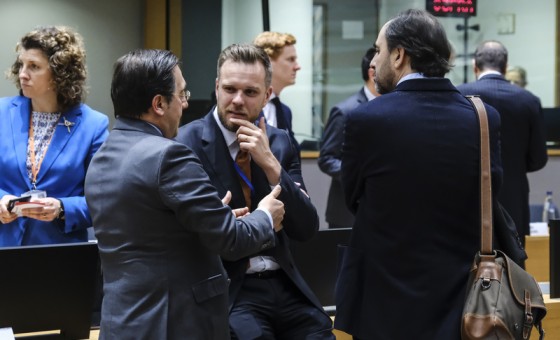On 20 March, the head of Lithuania’s diplomacy Gabrielius Landsbergis took part in the EU’s Foreign Affairs Council and a joint session gathering of EU foreign affairs and defence ministers.
Foreign affairs ministers discussed Russia’s accountability for every criminal action against the people of Ukraine, the need to improve the effectiveness of the implementation of sanctions against Russia and to prevent their circumvention, and the need to keep the pressure on Russia and to provide urgent military support for Ukraine.
“The issuance of an arrest warrant for Putin by the International Criminal Court is only the beginning of ensuring that Russian politicians are held accountable for the crime of aggression and other war crimes. The international community’s next move should be the UN General Assembly’s decision on establishing a Special Tribunal. Putin should be prosecuted not only for kidnapping Ukrainian children but also for the crime of aggression,” Landsbergis said.
The head of Lithuania’s diplomacy also called on his European counterparts to impose sanctions on Rosatom: “The existing contracts of the EU countries do not prevent Rosatom from being sanctioned. There must be only political will.”
Landsbergis once again drew the attention of his EU counterparts to the fact that the policy of exceptions to restrictive measures was flawed. “If under the pretence of food security, the Belarusian fertilizer maker, whose income was the largest source of wealth for the Lukashenka regime, was to be exempted from sanctions, then sanctions over enduring political repression, torture of political prisoners and human rights defenders in Belarusian prisons would be made null and void and all this in the context of Belarus’ military support for Russia,” Lithuania’s Foreign Minister said.
In a joint session gathering, EU foreign affairs and defence ministers agreed on the three-track proposal to urgently provide Ukraine with artillery ammunition.
“The agreement sends a powerful signal to the European defence industry to increase production,” Landsbergis said.
EU foreign ministers also discussed the extension of the Black Sea Grain Initiative, the need to find sustainable solutions for Ukraine’s grain exports and cooperation with third countries on the global consequences of Russia’s aggression.
In addition, foreign ministers briefly discussed the situation in Iran, internal repression, the policy of taking European hostages, Iran’s military support for Russia and further response measures.
Foreign ministers also exchanged their views on prospects for cooperation with Tunisia, the migration challenges and possible assistance to this country.

